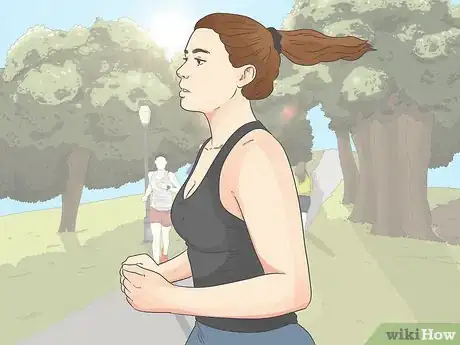This article was co-authored by Sarah Schewitz, PsyD and by wikiHow staff writer, Hunter Rising. Sarah Schewitz, Psy.D. is a licensed clinical psychologist by the California Board of Psychology with over 10 years of experience. She received her Psy.D. from the Florida Institute of Technology in 2011. She is the founder of Couples Learn, an online psychology practice helping couples and individuals improve and change their patterns in love and relationships.
There are 15 references cited in this article, which can be found at the bottom of the page.
This article has been viewed 14,111 times.
We know that it can sometimes be tough to feel good about yourself when you're a little shy. If you want to boost your confidence and be more comfortable around others, there are a lot of things you can do. We’ve got a ton of tips to help you recognize your potential so you can act confident in any situation!
Steps
Use positive self-talk.
-
Talking yourself up only makes you feel better about yourself. Rather than telling yourself something negative or thinking that social situations will go bad, tell yourself things will be alright. Give yourself some affirmations for what you want to achieve and tell yourself that you can do it. As long as you walk into something with a positive mind, you’ll be able to make the best of any situation.[1] X Research source
- For example, you could say something like, “I’m going to have a good time talking to new people at this party,” to boost your mood and help you achieve your goal.
Remember your past achievements.
-
Reflect on your successes to recognize what you should be proud of. It can be really easy to forget about the things you’ve accomplished if you aren’t confident in what you’ve done. Make a list of the things you’ve completed in the past and what you’re most proud of. Keep the list with you whenever you’re feeling down so you can remind yourself that you have the potential to do a lot of amazing things in your life.[2] X Research source
- For example, you could be proud of sticking with a difficult hobby or acing an exam you thought you failed.
Focus on your interests and hobbies.
-
You’ll feel a lot better about yourself doing something you love. People are a lot more likely to open up and branch out when they spend time with peers with the same interests. Look for clubs or meetups in your area that you can get involved with so you can meet other people. Get involved as much as you can so you can meet new people. Since you’re talking about things you’re all excited about, it’ll feel a lot more natural having a conversation.[3] X Research source
- You can use an app like Meetup or find groups on Facebook to join to learn about upcoming events near you.
Accept compliments when you receive them.
-
You’ll feel a lot better about yourself if you stop deflecting compliments. When you aren’t confident in yourself, it can be really easy to brush off when people say nice things about you. Instead, really listen to what they’re saying and take it to heart since it’s something positive they’ve recognized about you. Take a second to thank them and accept their feedback.[4] X Research source
Start exercising.
-
You can boost your mood and self-image with some regular workouts. Many studies have shown that working out can improve your self-esteem, so try to make it a regular routine.[5] X Research source Aim to get around 30 minutes of activity every day, either doing cardio or strength training. You’ll end up a lot more confident with how you look and making it a habit can help you feel more accomplished too.[6] X Research source
Practice good posture.
-
Standing tall can help you look and feel more confident right away. When you’re slouching or closing yourself off from people, it might make you seem like you’re a little more timid. Instead, roll your shoulders back, hold your head up high, and keep your arms at your side so you look more open and approachable. Take a few seconds to recognize how you’re presenting yourself and make changes when you need to.[7] X Research source
- Use a sticky note or a reminder on your phone if you have trouble remembering to check your posture.
Wear clothes that you feel good in.
-
Caring about your appearance makes you feel like your best self. Go through your closet and look for clothes that fit you well and match your own personal style. Rock your outfits and wear them proudly when you go out. Other people will notice when you’re feeling good about what you wear and it will help boost your self-esteem.[8] X Research source
- Don’t worry about the trends that are currently in style. Wear the things that make you feel the most comfortable and others will be sure to notice.
Set small goals to work toward.
-
Take baby steps so you don’t feel overwhelmed. Rather than setting large goals, like public speaking in front of a crowd, work up from less intense social situations. Pick a goal that’s easy to attain at first and try doing something more adventurous as you feel more confident. Work slowly toward the goals so there isn’t a lot of pressure.[9] X Research source
- For example, your goals could be saying hi to 3 strangers every day, making small talk with coworkers during lunch, or accepting an invitation you’d normally turn down.[10] X Research source
- Gaining confidence is always something you’ll keep working toward, so don’t worry if it takes you a while.
Spend time with small groups of people.
-
Start with intimate groups of people you know so you can break out of your shell. Immediately jumping into a conversation with a large crowd can be really daunting, so start with one-on-one conversations or groups of 3–4 people at a time. Since there’s not as much pressure in a smaller group, you’ll have an easier time having conversations and saying what’s on your mind.[11] X Research source
- Breaking into small groups also gives you a chance to practice talking before presenting to an entire crowd, so it works really well in educational and professional settings.
- Surround yourself with positive people instead of someone that brings you down.[12] X Research source
Try new things that scare you.
-
Going out of your comfort zone makes tough situations easier in the future. Acting confident really boils down to being okay with whatever happens to you. Try to find some new activities that you wouldn’t normally do, and challenge yourself to try them out. You may find out that they aren’t as intimidating as you thought and it’ll help you get in a confident mindset so you’re able to push yourself even more later on.[13] X Research source
- As a small example, you might try going to a concert alone or ordering some food you normally wouldn’t eat.
- Take it slow at first so you don’t get too overwhelmed.
Visualize social situations as successful.
-
Planning for something to go well helps people feel less anxious about it. If you’re ever nervous about meeting new people or going to a social gathering, try to imagine the best-case scenario. Focus on the topics you can bring up, how you want to feel by the end of the event, and the things you can control. Rather than focusing on what could go wrong, think about the things you can do right.[14] X Research source
Direct attention toward others.
-
Feel less anxious by redirecting peoples’ attention elsewhere. When everyone focuses on you, it could make you freeze up and get nervous again. If you’re feeling pressured, try turning your attention back to the audience of people and what’s happening around you rather than how you’re feeling on the inside. Take a few breaths to recollect your thoughts before continuing.[15] X Research source
Remind yourself that others won’t notice your shyness.
-
You notice how shy you are more than anyone else. It’s more likely that other people are thinking about how they’re coming off rather than you acting shy. When you’re worried about what other people think, remind yourself that no one else is focusing on it. Just remember that no one is spending their free time judging you, so you don’t need to feel nervous about it.[16] X Trustworthy Source HelpGuide Nonprofit organization dedicated to providing free, evidence-based mental health and wellness resources. Go to source
- Even if you think you did something embarrassing, people are much more tolerant and accepting than you think. Everyone makes mistakes, so it’s okay if you do too.
Warnings
- If you still have trouble opening up or improving, consider reaching out to a professional therapist or psychologist about your concerns.[18] X Research source⧼thumbs_response⧽
You Might Also Like
 How to Increase Your Self Confidence with Positive Daily Practices
How to Increase Your Self Confidence with Positive Daily Practices





 How to Build Your Self Confidence
How to Build Your Self Confidence



 The Best & Easiest Ways to Overcome Your Shyness
The Best & Easiest Ways to Overcome Your Shyness



References
- ↑ https://www.psychologytoday.com/us/blog/living-forward/201612/4-ways-overcome-shyness/
- ↑ https://au.reachout.com/articles/how-to-build-self-confidence
- ↑ https://www.psychologytoday.com/us/blog/growing-friendships/201606/helping-your-shy-child
- ↑ https://ideas.ted.com/5-ways-to-build-lasting-self-esteem/
- ↑ https://psycnet.apa.org/record/2000-08537-003
- ↑ https://www.nytimes.com/2019/06/03/smarter-living/how-to-improve-self-confidence.html
- ↑ https://www.inc.com/christina-desmarais/11-ways-to-build-your-confidence-and-appear-more-attractive.html
- ↑ https://www.inc.com/lolly-daskal/19-simple-ways-to-boost-your-self-esteem-quickly.html
- ↑ https://www.betterhealth.vic.gov.au/health/HealthyLiving/shyness-and-children
- ↑ https://www.psychologytoday.com/us/blog/science-and-sensibility/201206/overcoming-shyness-and-social-anxieties
- ↑ https://www.wgu.edu/heyteach/article/encouraging-students-participate-how-help-shy-students-speak1809.html
- ↑ https://www.inc.com/lolly-daskal/19-simple-ways-to-boost-your-self-esteem-quickly.html
- ↑ https://www.nytimes.com/2019/06/03/smarter-living/how-to-improve-self-confidence.html
- ↑ https://www.psychologytoday.com/us/blog/living-forward/201612/4-ways-overcome-shyness
- ↑ https://www.bbc.com/future/article/20190604-the-science-behind-why-some-of-us-are-shy
- ↑ https://www.helpguide.org/articles/relationships-communication/dealing-with-loneliness-and-shyness.htm
- ↑ https://www.psychologytoday.com/us/blog/living-forward/201612/4-ways-overcome-shyness
- ↑ https://psychcentral.com/anxiety/tips-for-overcoming-social-anxiety-and-shyness#consider-therapy
About This Article


























































